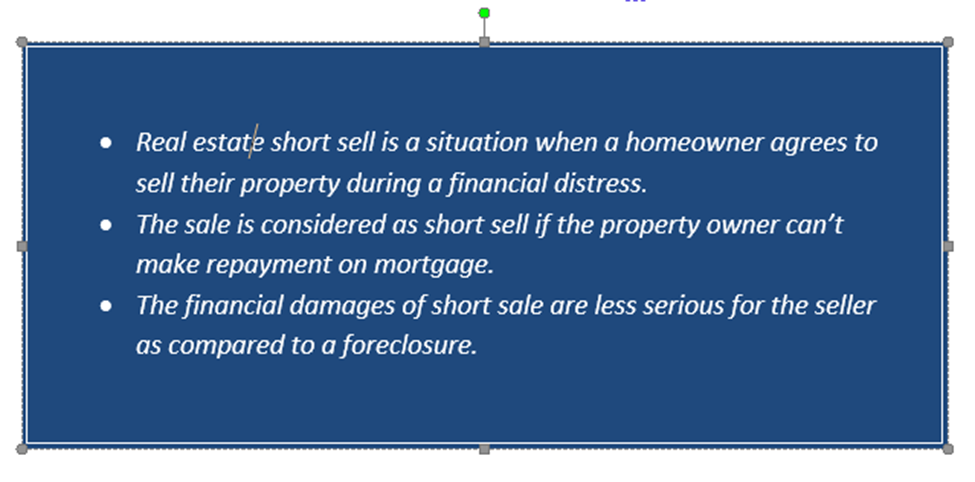Real Estate Short Sell
Updated on 2023-08-29T11:57:56.383551Z
What is a Real Estate Short Sell?
Real Estate Short Sell is a situation when a homeowner agrees to sell their property during a financial distress, for less than the amount due on the mortgage and the lender forgives the remaining balance of the loan. The sale is considered as short sell if the property owner can’t make repayment on mortgage and the market is bearish that the property is worth less than the remaining balance on the mortgage. All the earning from the sale goes to the lender, but the lender has to decide whether to approve a short sale. If the property is listed as short sale and even if the seller has approved, it does not mean the lender has to approve the offer.
The lender has only two options available, whether to go after the property owner through a deficiency judgment and pay full amount of mortgage to lender or to forgive the remaining balance. The financial damages of short sale are less serious for the seller as compared to a foreclosure.

Short sale Vs. Foreclosure
Both short sale and Foreclosure occurs when the property owner struggling to pay back the mortgage or their mortgage is underwater, which means the borrowers have to pay more mortgage payment than the value of property.
However, in short sell a seller seeks for lenders permission and submits a financial package to sell the property for less than the amount due on the mortgage and once it is approved by lender the seller is in charge of selling the property, but negotiation and acceptance to sell property is done by the lender.

Source: Copyright © 2021 Kalkine Media
Foreclosure refers to a legal action taken by the lender to confiscate the property in case the property owner fails to payback the mortgage amount. Both the situation can affect the seller’s credit negatively, but foreclosure has much more damaging effect on credit seller’s score, and it can be expensive for the seller and lender.
Who Benefits from a Short Sale?
A short sale may lower your credit score but not as bad as foreclosure, as in foreclosure you may lose your property without any amounts receive from it.
A short sale can be less damaging if the property owner can convince the lender to report the mortgage amount to credit bureaus as “paid in full”. The value of the property is worth less than its buying price with share of problem such as fixer-upper and the sale need to go thorough considerable red tape to make it possible. A lender may need a buyer to pay additional closing costs that may be normally assigned to the seller.
Everyone who is owed money has to agree to less or no money at all in the proceeds of short sale as the sale amount is less than the mortgage repayment and the costs of selling. This reason makes its process complex and slow.
Everyone involved in the transaction receive some benefit, but also have to give up a little too.
Step to buy a property through short sale
- Identify potential short sales
- By hiring experienced buyer’s agent, checking online listings or legal ads, you can look for pre-foreclosures in your area.
- Identify how much you owed as compared to your property value and if it is high the seller may find it difficult in selling it. You can leave those in which the seller has a lot of equity in the home and will prefer to foreclose and resell closer to the market price.
- View the house
Estimate the condition of your property and its cost to repair or renovation and in case its needed may normal buyers will not buy it which is good for you.
You need to know the value of property and its profit potential. You will expect profit from the sale if you are an investor or house owner, lining in the house for a short time.
- Find all liens and mortgages
Know all about which lender are the primary charge holder and the charges on the house. Further, verify this information through a title search before closing the sale, to make sure there are no confidential charges on the house.
You need to plan how you are going to pay on property. It you have a good credit score the leader may provide you loan. As they have almost all the information in the short sale paperwork, they may accelerate the loan application process.
In short sale you need the ability to move faster and once the sale is completed, the lender will need to close the deal in as few as 20 days.
You need to communicate with the resource recovery department or the lender’s loss mitigation department and need to complete and sign authorised letter from owner of property that gives lender permission to discuss the loan situation with you.
- Complete the short sale application
For short sale request, many lenders have an application and in case they don’t have, know what they need to approve a short sale.
The proposal usually includes the authorised letter, hardship letter and application, a detailed description of the costs and liabilities, purchase and sale contract, house value statement and settlement statement.
You need to know what your absolute highest limit is beforehand as its not uncommon for the lender to reject offer or to comeback with a counteroffer.
Once the buyer, seller and lender reach an agreement, take everything in written and officially recorded and make sure that the seller understands all the terms of the deal.